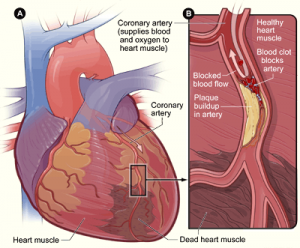What Is a Heart Attack?

Image from National Heart, Lung, and Blood Institute.
A heart attack is when oxygenated blood becomes blocked and doesn’t reach the heart. The heart muscle then begins to die, if the blood flow doesn’t reach the heart. This is why reacting as soon as possible can save a person’s life.
Causes
There are many reasons why people get heart attacks, but the majority of heart attacks are caused by Coronary Heart Disease (CHD). This is when a waxy substance called plaque builds up in the coronary artery. As the plaque builds up, sooner or later, the plaque may rupture causing blood to clot. Depending on the size of the clot it can partially or completely block the blood flow to the heart. If not treated in time the heart muscle will begin to die. Scar tissue will start to form possibly causing severe or long- term damage.
Symptoms
Most heart attacks start with discomfort in the center or left side of the chest. The discomfort can lasts few minutes or goes away and comes back. It can feel like pressure, squeezing, fullness, or pain. It also can feel like heartburn or indigestion.
We may feel pain or discomfort in one or both arms, back, shoulders, neck, jaw, or upper part of the stomach.
Other symptoms:
Breaking out in a cold sweat without any reason. we can feel unusually tired, sometimes for days woman are usually the ones to show this symptoms. Nausea feeling sick to the stomach and vomiting. Also feeling light headed or dizzy.
Resources
“What is a Heart Attack”; National Heart, Lung, and Blood Institute. Updated June 22,2015. https://www.nhlbi.nih.gov/health/health-topics/topics/heartattack


